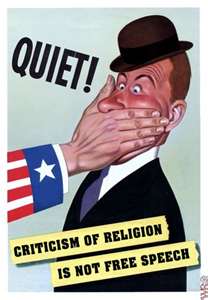
The Establishment Clause addressed the concerns of members of minority faiths who did not want the federal government to establish a state religion for the entire nation.

By December 1791, ten of his Amendments were ratified by the necessary three quarters of the states, and they became part of the US Constitution, thereafter becoming known as "the Bill of Rights". When the First Federal Congress met in 1789, Madison implemented the idea by introducing 17 Amendments to the Constitution. Later, six more states likewise recommended the addition of a Bill of Rights, and the idea was also endorsed by Jefferson and Madison. : 9–10 Nevertheless, the supporters of the Constitution (known as Federalists) in order to secure its ratification in Massachusetts, agreed to add a group of amendments to the Constitution after its ratification that would serve as a Bill of Rights. Alexander Hamilton later argued in The Federalist Papers that a Bill of Rights was unnecessary, claiming that since the Constitution granted limited powers to the federal government, it did not grant the new government the power to abuse the rights that would be secured by a Bill of Rights. : 9 His proposal was rejected by the other delegates. The idea of adding a Bill of Rights to the Constitution was proposed by George Mason five days before the conclusion of the Constitutional Convention held in Philadelphia in 1787. The First Amendment is part of a group of 10 Amendments to the United States Constitution known as the Bill of Rights. The original Mason-Dixon line was the demarcation line between the Catholic colony of Maryland and the New Jersey and Pennsylvania colonies, which followed the 1689 Bill of Rights and their own colonial constitutions which provided similar protections against the establishment of Catholic laws in government.
FREEDOM OF RELIGION MEANING FREE
The 1689 English Bill of Rights secured the rights of all "persons" to be free from establishment of Roman Catholic laws in the government of England.Ĭolonial New Jersey and Pennsylvania Constitutions The Constitutions of Clarendon, a 12th-century English law, had prohibited criminal defendants' using religious laws (at that time, in medieval England, canon law of the Roman Catholic Church) to seek exemption from criminal prosecution. Historical background Constitutions of Clarendon While the Establishment Clause does prohibit Congress from preferring one religion over another, it does not prohibit the government's involvement with religion to make accommodations for religious observances and practices in order to achieve the purposes of the Free Exercise Clause. The Free Exercise Clause prohibits the government from preventing the free exercise of religion.

The Establishment Clause is a limitation placed upon the United States Congress preventing it from passing legislation establishing an official religion, and by interpretation making it illegal for the government to promote theocracy or promote a specific religion with taxes.

The Establishment Clause is complemented by the Free Exercise Clause, which allows individual citizens freedom from governmental interference in both private and public religious affairs. In 1789, then-congressman James Madison prepared another draft which, after discussion and debate in the First Congress, would become part of the text of the First Amendment of the Bill of Rights. An initial draft by John Dickinson was prepared in conjunction with his drafting the Articles of Confederation. The clause was based on a number of precedents, including the Constitutions of Clarendon, the Bill of Rights 1689, and the Pennsylvania and New Jersey colonial constitutions. territories, are prohibited from establishing or sponsoring religion. By it, the federal government of the United States and, by later extension, the governments of all U.S. The Establishment Clause acts as a double security, prohibiting both religious abuse of government and political control of religion.

The relevant constitutional text is:Ĭongress shall make no law respecting an establishment of religion. In United States law, the Establishment Clause of the First Amendment to the United States Constitution, together with that Amendment's Free Exercise Clause, form the constitutional right of freedom of religion.


 0 kommentar(er)
0 kommentar(er)
